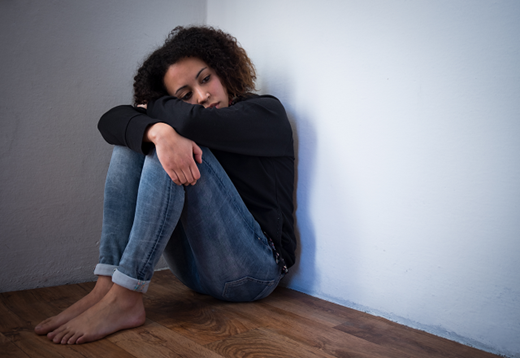Mental Health Among African American Women
Featured Expert:
It’s true that everyone experiences temporary periods of sadness, and times of worry and nervousness. But what about when those feelings won’t go away? Too often, women of color try to muscle their way through depression and anxiety on their own says Erica Richards, chair and medical director of the Department of Psychiatry and Behavioral Health at Sibley Memorial Hospital. This can be a mistake: What you really need is someone to help you sort out what you’re going through and to provide support and treatment options.

This is especially true during the coronavirus pandemic, when symptoms of anxiety and depression have been higher than prior to the arrival of COVID-19 in our communities. We are seeing an increasing number of patients with worsening (or new onset of) symptoms. It is, therefore, important to normalize the discussion surrounding mental health for minority communities.
“Anyone can experience mental illness. There is no group, gender, sexual identity, race or cultural belief that can prevent it from occurring,” says Richards. “And it’s actually happening at higher rates than most other illnesses, including heart disease, diabetes and cancer.”
That’s especially alarming for minority women. Women are at least twice as likely to experience an episode of major depression as men, Richards reports. And, compared to their Caucasian counterparts, African American women are only half as likely to seek help.
Access to mental health care with cultural sensitivity is often listed as a consideration for minority women seeking care from psychiatric providers. More people, including high-profile celebrities — actors, singers and political representatives from minority communities — are opening up about their battles with depression, including, at times, thoughts of suicide. Recently, several high-profile suicides have initiated conversations about treatment options and the devastating impact of suicide on family and friends left to process their loss. Normalizing this discussion will continue to be a key factor in helping others identify when and how to seek help.
Make Mental Health Your Priority
Part of the challenge in getting care is the cultural belief that only people who are “crazy” or “weak” see mental health professionals. “There’s a feeling in a lot of Black communities that women have to be strong and stoic,” Richards explains. “Women are so busy taking care of everyone else — their partners, their elderly parents and their children — they don’t take care of themselves. However, women should be reminded that attending to their own needs, whether physical or emotional, doesn’t make you weak. It makes you better able to care for your loved ones in the long run.”
There’s no replacement for the help you can get from a mental health professional. But, you can also safeguard your emotional health through these self-care practices:
- Get good rest: Aim for at least seven hours of sleep each night. Lack of sleep destabilizes your mood, making everything you do less effective.
- Move more: Exercise 30 minutes every day for better health and a boost of feel-good endorphins that can help some people manage or prevent depression symptoms.
- Eat well: A healthy mix of fruits, vegetables and protein keeps energy levels steady, helping you better manage the ups and downs of your day.
- Connect: Schedule time with a friend every week, even for a quick cup of coffee or a walk. Many studies have shown that social support improves women’s mental well-being, helping to reduce stress and the effects of depression.
- Meditate: Johns Hopkins researchers found that people who took an eight-week course in mindfulness meditation were able to improve their depression, anxiety and pain symptoms.
- Know your limits: As much as possible, decline requests that create unnecessary stress, such as hosting parties or planning events. Setting boundaries at work, such as not checking email after a certain time, can also help reduce stress.
Seminar Upcoming Podcasts: A Journey for Women of Color

Signs of Depression and Mood Disorders
What’s the difference between feeling blue or run-down and something more serious? Depression is most common between the ages of 25 and 44, but can occur at any age, says Richards. And while depression is the most common mood disorder, anxiety disorders and bipolar disorder are prevalent, too. Some signs that indicate a mental health condition include:
- Sleeping more or less than usual
- Increased or decreased appetite
- Feeling worthless, hopeless or empty
- Feeling disinterested and unable to enjoy things that usually bring pleasure
- Mood swings
- Feeling out of control
- Difficulty concentrating
If you or a loved one have experienced these or other symptoms for two weeks or longer, you should seek help from a health professional.
Treatment Options and Finding the Right Support
As a woman of color, you may want to find a health care provider who looks like you or who has had similar life experiences. It’s understandable, but difficult to do. Unfortunately, women of color make up less than 5% of psychiatrists, psychologists and social workers available to treat patients.
Instead, says Richards, focus on connecting with a provider who is open to learning about you and your life circumstances. It doesn’t have to be someone who specializes in mental health and may not necessarily be a provider of color. Often, primary care doctors and gynecologists feel comfortable prescribing medications to treat depression, anxiety and other mood disorders, and they can often refer you to a colleague who can provide additional specialized treatment (medications and/or talk therapy). What’s important is that your team of providers get to know you, work with you to make a diagnosis and establish a treatment plan that is right for you. Learn more about factors to consider when choosing a therapist.
Taking the First Steps
- Talk to your primary care doctor or gynecologist.
- Reach out to a friend, partner or community member you trust.
- Remain consistent and committed to your treatment.
Remember, there are millions of people with depression who are getting treatment and living successful lives. Join them and take control of your health.
#TomorrowsDiscoveries: How the Brain Processes Incentives and Rewards | Vikram S. Chib, Ph.D.
Johns Hopkins researcher Vikram S. Chib studies the way incentives and rewards work in the brain and how this can lead to breakthroughs in depression treatment.







